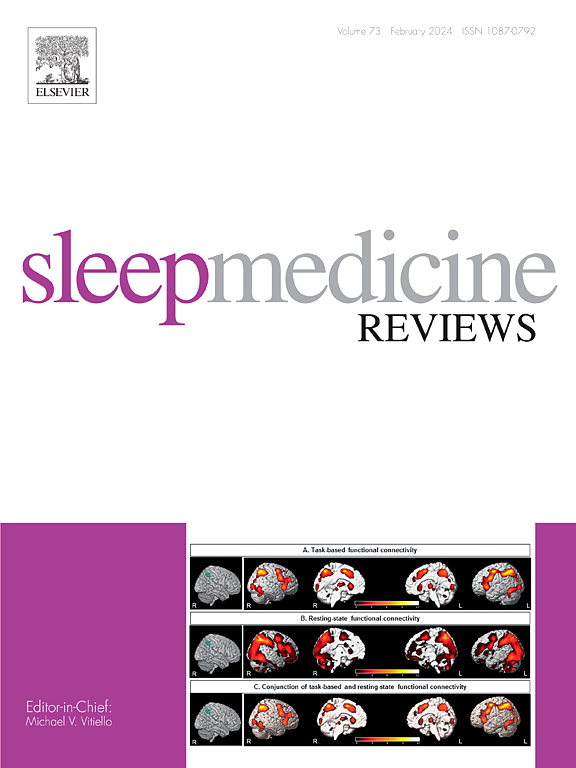基于肠促胰岛素治疗肥胖相关阻塞性睡眠呼吸暂停的疗效:随机对照试验的系统回顾和荟萃分析
IF 9.7
1区 医学
Q1 CLINICAL NEUROLOGY
引用次数: 0
摘要
阻塞性睡眠呼吸暂停(OSA)的主要病因危险因素是肥胖。由于以肠促胰岛素为基础的治疗,特别是胰高血糖素样肽1 (GLP-1)和双重GLP-1/葡萄糖依赖性胰岛素多肽(GIP)激动剂,在肥胖治疗中显示出有希望的结果,这些药物引起了对OSA治疗的兴趣。为了研究它们对OSA的疗效,我们按照PRISMA和Cochrane手册的指南进行了系统的文献检索,以报道OSA患者的呼吸暂停低通气指数(AHI)和肠促胰岛素为基础的治疗。只有随机对照试验才有资格纳入。我们检索了813篇文献,其中5篇符合纳入标准。总的来说,这些研究纳入了1024名患者,利拉鲁肽或替西帕肽持续≥12周,体重和/或体重指数显著降低。以肠促胰岛素为基础的治疗也与AHI降低相关,平均变化为- 14.45事件/小时(95% CI: 25.90至- 2.99,p <;0.001)。通过将5个随机对照试验的数据进行配对荟萃分析,以肠促胰岛素为基础的治疗对AHI的影响大于常规治疗,平均差异为- 11.61事件/小时(95% CI: 22.91至- 0.31,p = 0.046)。我们的分析表明,通过以肠促胰岛素为基础的治疗减轻体重可以改善OSA患者的AHI。以肠促胰岛素为基础的疗法有可能治疗超重的阻塞性睡眠呼吸暂停患者的睡眠呼吸障碍。本文章由计算机程序翻译,如有差异,请以英文原文为准。
Efficacy of incretin-based therapies in obesity-related obstructive sleep apnea: a systematic review and meta-analysis of randomized controlled trials
The primary etiologic risk factor for obstructive sleep apnea (OSA) is obesity. As incretin-based therapies, specifically glucagon-like peptide 1 (GLP-1) and dual GLP-1/glucose-dependent insulinotropic polypeptide (GIP) agonists, have shown promising outcomes in obesity management, these medications have generated interest in OSA therapy. To investigate their efficacy in OSA, we performed a systematic literature search following PRISMA and Cochrane Handbook guidelines for studies reporting apnea-hypopnea index (AHI) and incretin-based therapy in patients with OSA. Only randomized controlled trials were eligible for inclusion. Our literature search identified 813 publications, and 5 articles met the inclusion criteria. Collectively, the studies enrolled 1024 patients, lasted ≥12 weeks with liraglutide or tirzepatide, and resulted in significant reductions in body weight and/or body mass index. Incretin-based therapies were also associated with AHI reduction, with a mean change of −14.45 events/h (95 % CI: 25.90 to −2.99, p < 0.001). By pooling data of 5 RCTs in a pairwise meta-analysis, incretin-based therapies showed a greater effect on AHI than usual care, with a mean difference of −11.61 events/h (95 % CI: 22.91 to −0.31, p = 0.046). Our analysis demonstrates that weight reduction through incretin-based therapies improves AHI in OSA. Incretin-based therapies have the potential to treat sleep-disordered breathing in OSA patients with excess weight.
求助全文
通过发布文献求助,成功后即可免费获取论文全文。
去求助
来源期刊

Sleep Medicine Reviews
医学-临床神经学
CiteScore
20.10
自引率
3.80%
发文量
107
期刊介绍:
Sleep Medicine Reviews offers global coverage of sleep disorders, exploring their origins, diagnosis, treatment, and implications for related conditions at both individual and public health levels.
Articles comprehensively review clinical information from peer-reviewed journals across various disciplines in sleep medicine, encompassing pulmonology, psychiatry, psychology, physiology, otolaryngology, pediatrics, geriatrics, cardiology, dentistry, nursing, neurology, and general medicine.
The journal features narrative reviews, systematic reviews, and editorials addressing areas of controversy, debate, and future research within the field.
 求助内容:
求助内容: 应助结果提醒方式:
应助结果提醒方式:


